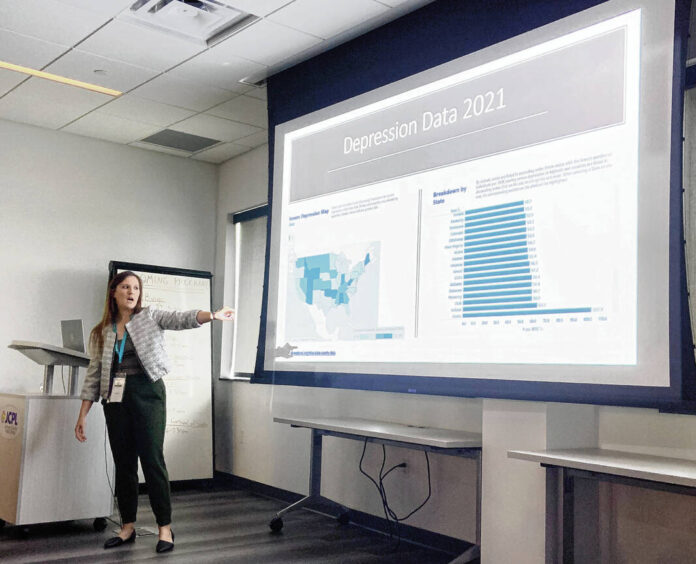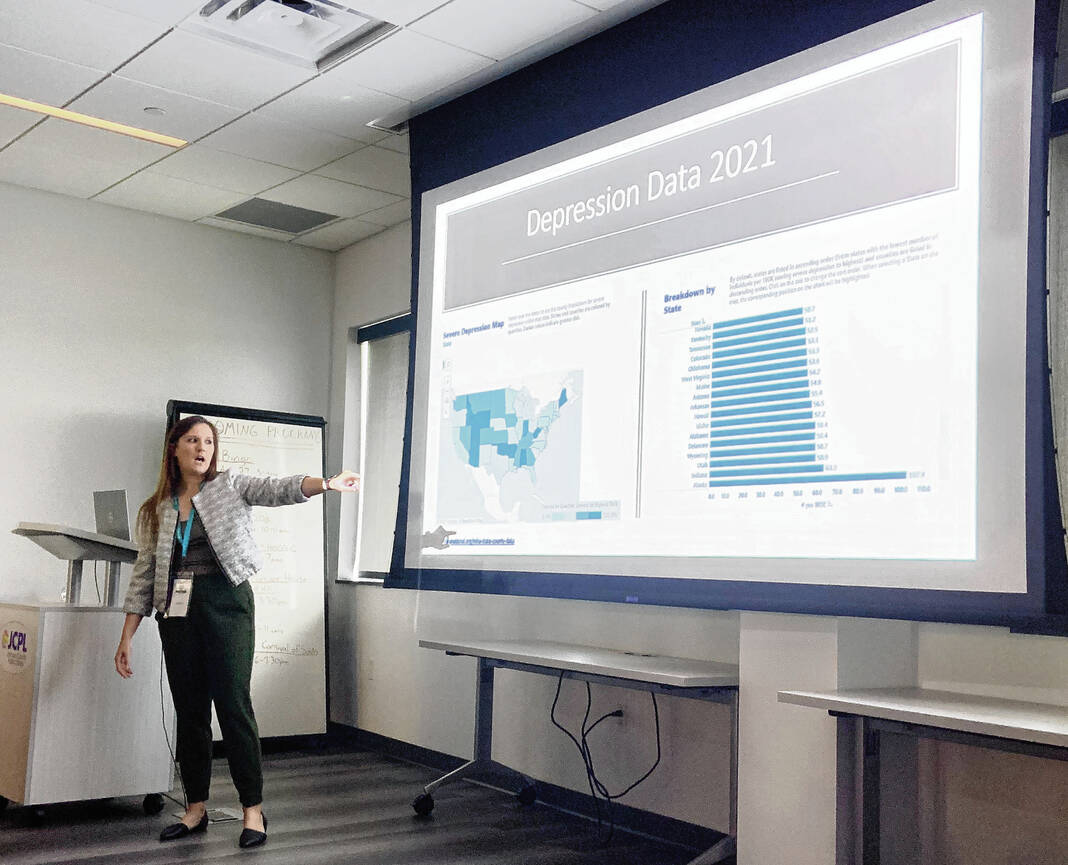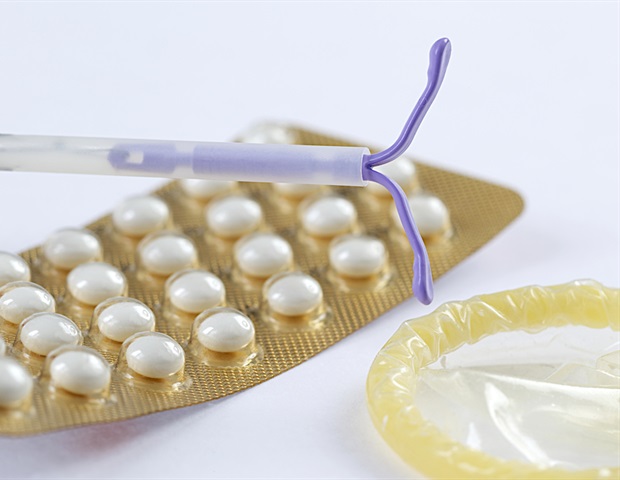[ad_1]

Amber Welsh, vice-chair of the Suicide Prevention Coalition of Johnson County and community health program manager for IU Health, discusses data on depression in Indiana during the State of Mental Health address Sept. 14 at the Clark Pleasant branch of the Johnson County Public Library. Welch presented a range of data and information illustrating the mental health struggles facing county residents.
RYAN TRARES | DAILY JOURNAL
The numbers and data painted a bleak picture.
Among Johnson County residents, 72 people died by suicide between 2019 and 2021. According to a voluntary mental health screening, 76 county residents were found to have severe depression in 2021 — an increase of 13 people from 2020.
Indiana as a whole ranked as one of the 13 worst states for prevalence of mental illness in 2022. The state was 48th in trauma survivors, 48th in public health funding, and 50th — dead last — in overall depression.
“If you are a female and you live in Indiana, you are the most depressed class of person in our country, as of 2021,” said Amber Welsh, vice-chair of the Suicide Prevention Coalition of Johnson County and community health program manager for IU Health. ”Females in Indiana are the most depressed, and Indiana is the most depressed state.”
The sharp challenges facing Johnson County and the state came into focus Tuesday, as mental health specialists and community leaders gathered for the county’s first-ever State of Mental Health address. People throughout Johnson County are struggling with feelings of hopelessness, thoughts of suicide and other issues, officials say.
The situation is bad, and data that comes out in coming years are unlikely to show it getting better, Welsh said. But by connecting at events such as Tuesday’s address, the community can work together to improve mental health outcomes for everyone.
“This is our state. I’m not here to depress you all, but I think we need to know where we’re starting,” Welsh said.
The State of Mental Health event was designed to present data collected throughout the county about mental health among residents, both young and old.
Planned in recognition of Suicide Prevention Month, the address was hosted by the Suicide Prevention Coalition of Johnson County. The coalition, a branch of public health nonprofit Upstream Prevention, aims to prevent suicide by mobilizing the community through education and use of resources to increase awareness and decrease stigma.
On Tuesday morning, people packed into the Clark Pleasant library to get a more clear picture of the extent of mental health problems in the county.
Topics ranged from issues facing military members and veterans to employer health to mental health from the perspective of law enforcement. Much of it was digging into the startling data that had been compiled using numbers collected from local, state and national sources.
On the surface, Johnson County would seem to be doing well in terms of health, Welsh said. The county ranks 6th in the state in overall health outcomes, or the health of people due to the health systems around them. Johnson County also ranked 7th in health factors — community characteristics that increase the likelihood of developing disease or a health disorder.
Those numbers are deceiving, Welsh said.
“Yeah, we’re doing pretty well, but in one of the worst states,” she said. “You have to dive deeper into these overall health rankings.”
Getting into the numbers illuminates how much work needs to be done in terms of mental health. Numbers from a voluntary screening by Mental Health America showed that Johnson County had significant numbers of people who experience severe depression and had thoughts about suicide.
According to the survey, 149 county residents self-identified as trauma survivors in 2021. In 2020, 17 county residents died by suicide using a firearm.
“Those are the most recent numbers we have, but it’s going to get worse. I’m betting you, the 2021 data is going to get worse,” Welsh said.
A large portion of the address was dedicated to youth. Across Indiana, 28% of adolescents ages 12 to 17 reported having a mental, emotional, developmental or behavioral issue. Bullying remained an issue; 38% of Indiana children ages 12 to 17 reported being bullied.
Data broken down by age group showed that younger people were increasingly impacted by suicide.
“Our adolescents are either attempting more, having suicide ideations more or dying by suicide more,” Welsh said. “Those numbers have just shot up.”
Compounding the issue is the lack of mental health services in the county, Welsh said. In 2019, the county had a ratio of one mental health provider for every 1,150 county residents. That’s significantly worse than the state average of one provider for every 620 Indiana residents.
“It’s not sustainable. We have too many people in our community who need some form of mental health help. And with that ratio of mental health providers, we just don’t have that,” Welsh said.
But despite the troubling data, the county had also made positive progress in addressing some aspects of mental health.
The Johnson County Sheriff’s Office had launched its Crisis Intervention Team specifically designed to identify and respond to mental health and other crises. Since forming, the team’s three full-time members had responded to 163 calls.
Local officials were also excited about the launch of 988, the three-digit nationwide suicide and crisis hotline. In 2020, Congress designated the new 988 dialing code to be operated through the existing National Suicide Prevention Lifeline. Health care officials see 988 as a first step towards a transformed crisis care system in America.
And interest in Tuesday’s presentation in front of a packed room of elected officials, law enforcement officers, school administrators and health care providers was another positive, Welsh said.
“I’m hoping that when we leave today, we go back and see if you can start some conversations about these issues,” she said. “We’ve got to get these things to policy level, and we have to get policy changes.”
How to get help
If you or someone you know is having thoughts of suicide, there are resources available. Call the Suicide Prevention Lifeline at 988 or text IN to 741741. Upstream Prevention also has a list of local mental health resources on our website at www.upstreamprevention.org.
Upcoming suicide prevention trainings
Sept. 20: Columbia Suicide Severity Rating Scale recent screener review, noon, virtual via Zoom, register at https://C-SSRS-Sept20.eventbrite.com
Sept. 21: QPR (Question, Persuade, Refer) Gatekeeper Training, noon, virtual via Zoom, register at https://Sept21QPRtraining.eventbrite.com
Sept. 29: Columbia Suicide Severity Rating Scale recent screener review, noon, virtual via Zoom, register at https://C-SSRS-Sept29.eventbrite.com
Oct. 18: QPR (Question, Persuade, Refer) Gatekeeper Training, noon, Johnson County Public Library Franklin branch, 401 State St., register at https://Oct18QPR.eventbrite.com
Oct. 18: Columbia Suicide Severity Rating Scale recent screener review, 2:30-3:30 p.m., Johnson County Public Library Franklin branch, 401 State St., register at https://Oct18C-SSRS.eventbrite.com
Information: Contact [email protected] to schedule trainings for your group.
[ad_2]
Source link



